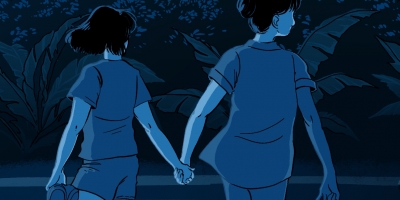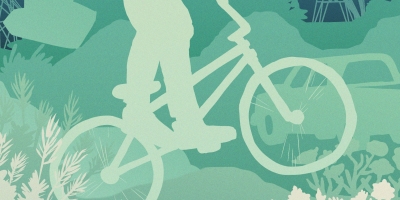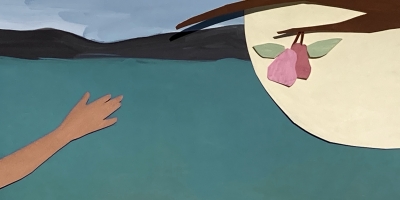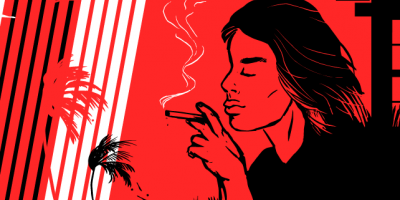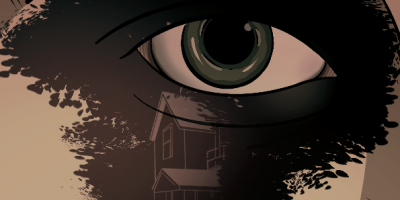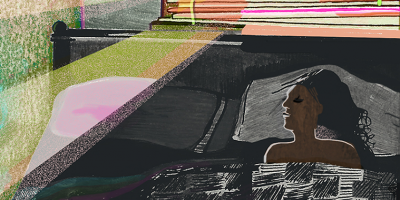Nonfiction
How to Tell A Trauma Story
by Bethany Marcel

This story begins with a punch in the face. My face. The woman’s fist.
For a decade I’ve been trying to write this story. This is always as far as I get.
I’ve tried telling the long version of this story and the short one.
The long version: I felt alone and had since childhood. I had trauma in me I hadn’t yet recognized. My body was carrying it for me. I’d allowed it that burden.
I was in my early twenties and living in Bellingham, Washington, where a friend came to visit me one day. We were walking down the street when I saw the woman from a distance.
At first she was a stranger like any other. She was wearing a dark and heavy coat. On her face, a frown and a furrowed brow. It was afternoon. Sunny. She was lumbering toward us.
Once near, the woman looked at me. I thought she was going to speak. Maybe ask a question. What time is it? There was a smile on my face, open and waiting.
But she didn’t speak, and neither did I. She raised her fist.
After, I needed to know I could trust strangers. Maybe that’s why I left.
My favorite way to travel is alone. I love to build a temporary life, then dismantle it. I needed to sit alone on an airplane next to a stranger who wouldn’t harm me. I needed to feel the awkward brushing past of another in a cramped space. To feel the heat of them beside me, but believe I was safe from it.
I needed to be a nobody. To stand alone in a museum and let the strangers rush past, no one caring who—or what—I was. To make friends and lovers who were temporary. I wanted to travel far from home and walk in the snow with someone who would only know me for a short while. I didn’t want to get too close. I didn’t want us to touch. I wanted us to walk with possibility between us. I wanted to know a person for a few safe weeks. To have a flight to catch after. To leave without scars.
The short version: over time, I learned to flinch.
More than a decade later, I jump when my husband walks into a room. “It’s just me,” he says. “I live here.”
Where do I live if not here? Inside some aspect of my trauma?
After the woman punched me, my nose bled. I cupped my hands to my face to catch the bright red pooling in my open palms. Here, my memory fractures.
The stranger continued down the street. Wordlessly shuffling.
I looked up, stretching my neck. Blue sky.
My face numb. No feeling. Blood running down my arms, staining my shirt.
My friend’s body somewhere beside me. But hazy, distant.
Later on, my friend told me I uttered a single word.
But I only remember looking up.
I only remember blue sky.
I only remember red blood.
My friend says I stared up, blank expression, and asked, Why?
I had a black eye. I was in college at the time, and I went to class. I wanted someone, anyone, to ask me what had happened. I thought of the reasons a young woman might have a black eye. I looked around the room, waiting.
I waited. I waited.
But no one asked. I sat in class, in their silence, thinking of all the ways silence keeps us sick, of all the many ways we have of failing each other.
Even now, I’m shaping this story.
There’s a version that might make you laugh. It’s the one I tell at parties. “Did you know I was once punched in the face by a stranger on the street?” It surprises people. One time, after telling it, a man took my face in his hands. “This face,” he said. “Who could punch this beautiful face?” But I hadn’t said it was okay for him to touch me.
There’s a version that’s a long narrative. One in which I provide every detail. I wrote it after a writing instructor commented, “We don’t care what you think about this or that. We just want to be told the story.”
I tried.
I tried to make it palatable.
But perhaps my trauma has fragmented me.
There are other stories. Ones I don’t want to tell.
For instance.
I don’t want to say.
I don’t want to say how the man.
I don’t want to say how the man grabbed me.
How the man grabbed me and put his hand.
His hand between.
My legs.
I don’t want to say—the rest of it.
In many ways, the story of the punch is the easiest one to tell.
I sometimes wonder if it has taken me so long to tell it because I fear what comes after.
There’s the trauma I didn’t remember.
I’m not willing to tell the whole story of it, but let’s say a mother leaves their child in a field somewhere. Let’s say that child grows up and has a memory of a field, but the memory is blurry. The child isn’t sure. Is it a field, or is it a marsh? Is it a swamp, or is it a jungle? Is it the child, or someone else in the field? Let’s say the child loves their mother so much they can no longer access that field. Let’s say the child doesn’t remember the field but lives with the field inside their body for decades. Let’s say one day that body breaks and the field emerges.
Let’s say the child needs to write it but can’t. Let’s say they create a field and place the child in it. Their body becomes not their own but a story. Let’s say by making their body a story, the child is hoping to heal.
But they don’t know if it’s even possible.
How do we tell a trauma story?
First of all, we don’t have to.
We don’t—
We don’t have to.
But if we do, I believe we can allow it to exist as it desires. I understand the impulse to know every detail. But I have to believe telling our trauma doesn’t need to include flaying ourselves. That it’s enough to say, This happened to me.
This happened to me.
For a long time, I expected my trauma to release all at once. I wanted the floodgates to open. For my healing to be linear. When it didn’t work that way, I became disappointed, then frustrated, then, for a time, hopeless.
Not so long ago I woke up in the night and believed I was dying. I was taken by ambulance to the ER, where they gave me drugs but told me nothing. The next morning, after scouring the internet for information, I realized I’d had a panic attack. After that, at night, my heart raced when I closed my eyes. I woke to soaked sheets, wet from my body shedding its sweat.
For years, I tried to deny my trauma. I pushed it down into my body until my body became sick. Headaches, stomachaches, insomnia, dizziness, heart palpitations. I did this for over a decade.
At last, the panic forced a reckoning.
We open to healing slowly. Not a clenched fist to an open palm, but a gradual relaxing of the hands. As I write, for instance, my body is at ease. Breath flowing, belly slack. This doesn’t erase my trauma. But it does provide a moment of relief.
Did I mention I was punched in front of a violin shop?
Afterward, I went inside. I was holding my nose to stop the blood.
I said, “Help.”
I said, “Help, I was punched.”
I said, “Fuck. Goddammit. Fuck.”
A young girl was in the middle of a violin lesson. Her mother looked at me. At the blood running down my face. At my wild eyes. She quickly escorted the girl out of the shop, rushing past me. I imagine this girl is not a violinist now.
Are you laughing yet? This part can be funny when I tell it. If I get the tone right, I can make a crowd laugh. Are you taking my face in your hands? Am I beautiful to you yet?
But here’s the thing. The man who owned the violin shop took care of me that day. He told me to sit down. He gathered toilet paper from his bathroom for me to stuff up my nose. He didn’t touch me. He handed it to me. He called the ambulance and waited beside me for it to arrive.
Over a year later, I walked back into that same violin shop. The man was there.
“It’s me,” I said. “The person who was punched in front of your shop. Do you remember?”
“Of course,” he said. “Of course I remember you. This is my daughter. She was there in the back room that day.”
He gestured to the girl beside him. Then he turned toward her: “You remember, right?”
“Of course I do,” she said.
I said to the man, “I just wanted to say you were so kind to me that day. I just wanted you to know I won’t forget.”
I tried to memorize two things, then: the look on his face, and the look on his daughter’s face as she looked at him.
I don’t know how healing happens, but I imagine at some point it begins.
If I knew another way, I would. I don’t.
Maybe we find meaning in the sharing. Maybe we don’t. I don’t know. I only know my body hurts less when I use my fingers to type. That when I walk beside you, a stranger, I feel every possibility between us. That in every lost field there is also something hidden and waiting.
I just want this for us. To love without flinching. To slowly unclench our fists.
And so I am here.
I am holding my black eye out.
I am saying, Look.
